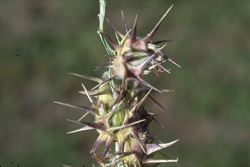Click on images to enlarge

close-up of fruit with several broad-based spines (Photo: Rob and Fiona Richardson)
Scientific Name
Cenchrus spinifexCav.
Synonyms
Cenchrus incertus M. Curtis
Cenchrus pauciflorus Benth.
Cenchrus tribuloides L. (misapplied)
Family
Gramineae (South Australia)Poaceae (Queensland, New South Wales, the ACT, Victoria, Tasmania, Western Australia and the Northern Territory)
Common Names
American burr grass, American burrgrass, bayonet grass, burr grass, burr-grass, burrgrass, coast sandbur, coast sandbur grass, coast sandburr, coast sandspur, coastal sandbur, common sandbur, dune sandburr, field burr, field sandbur, field sandburr, field sandspur, gentle Annie, hedgehog grass, innocent weed, lesser burrgrass, longspine sandbur, mat sandbur, sandbur, sandbur grass, sandburr, spiny burr grass, spiny burr-grass, spiny burrgrass, spring burrgrass
Origin
Native to North America (i.e. USA and southern Mexico), Central America (i.e. Belize, Costa Rica, El Salvador, Guatemala, Honduras, Nicaragua and Panama), the Caribbean and tropical South America (i.e. Brazil, Bolivia, Colombia, Ecuador, Peru, Argentina, Chile, Paraguay and Uruguay).
Naturalised Distribution
A widespread species that is largely found in eastern Australia. It is naturalised in inland southern and central Queensland, throughout much of New South Wales, in the ACT, in northern Victoria, in the southern parts of South Australia and in the coastal districts of south-western Western Australia.
Notes
This short-lived grass is mainly recognised as a agricultural weed, but it was recently also listed as a priority environmental weed in two Natural Resource Management regions. Spiny burrgrass (Cenchrus incertus) usually grows on sandy soils in disturbed areas (e.g. on roadsides, in pastures, in gardens, and in crops and cultivation), but also invades native rangelands, grasslands, open woodlands and coastal environs.

